Corporate Responsibility: Building Positive Employee Relationships
VerifiedAdded on 2022/11/13
|5
|1117
|134
Essay
AI Summary
This essay examines the crucial role of corporate responsibility in fostering positive and productive employee relationships. It highlights the benefits of good relations at work, including increased innovation, productivity, and employee satisfaction. The essay emphasizes the importance of effective communication, ethical practices, and fairness in all dealings. It outlines key strategies for managers, such as providing clear instructions, working as a team, appreciating employees, and upholding honesty and transparency. The essay also discusses the importance of training, setting clear objectives, and ensuring employee well-being. By implementing these principles, managers can build trust, respect, and open communication, leading to a more functional, ethical, and productive work environment. The essay concludes by reiterating the significance of corporate responsibility in achieving business success and providing a detailed overview of the necessary steps to build strong employee relationships.
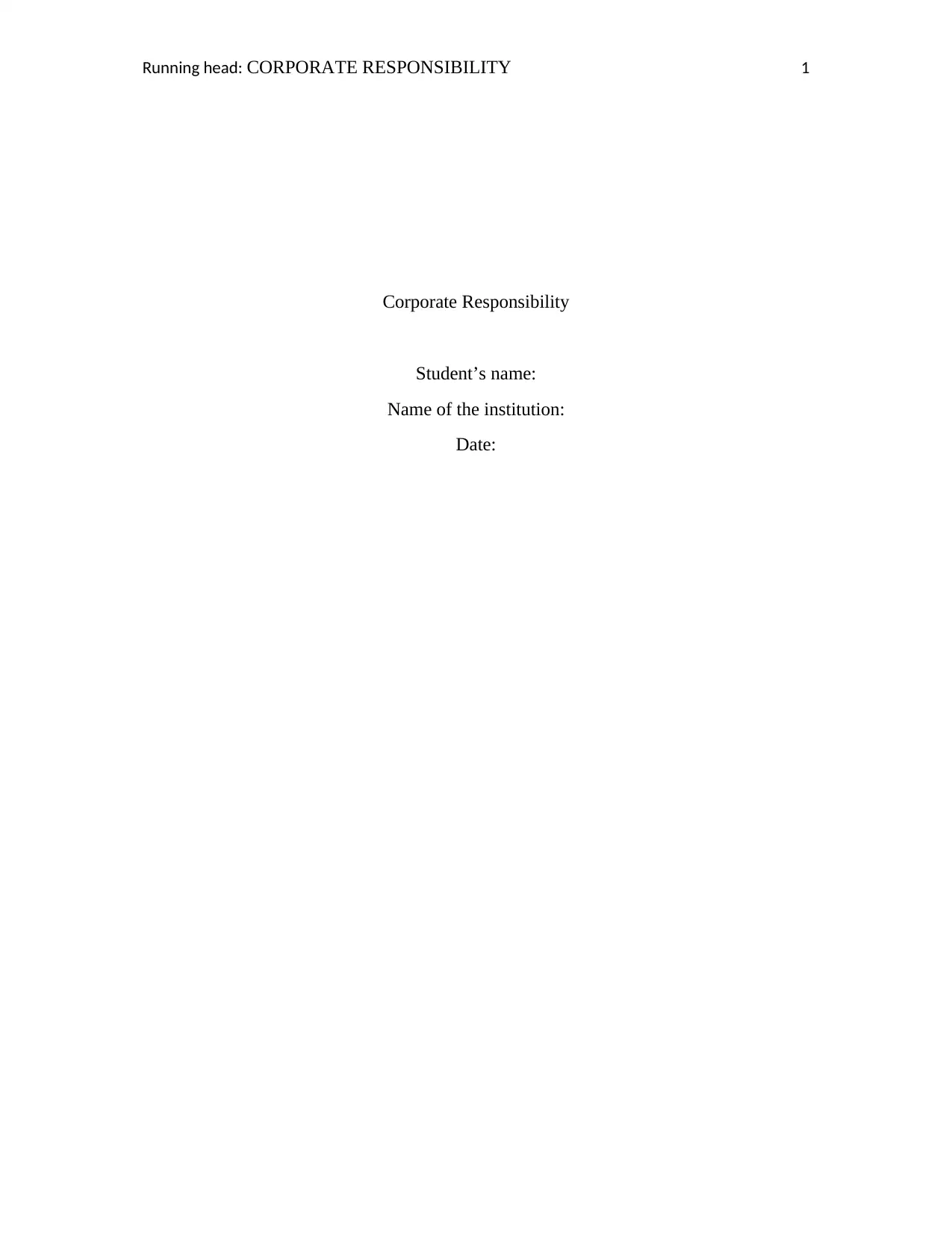
Running head: CORPORATE RESPONSIBILITY 1
Corporate Responsibility
Student’s name:
Name of the institution:
Date:
Corporate Responsibility
Student’s name:
Name of the institution:
Date:
Paraphrase This Document
Need a fresh take? Get an instant paraphrase of this document with our AI Paraphraser
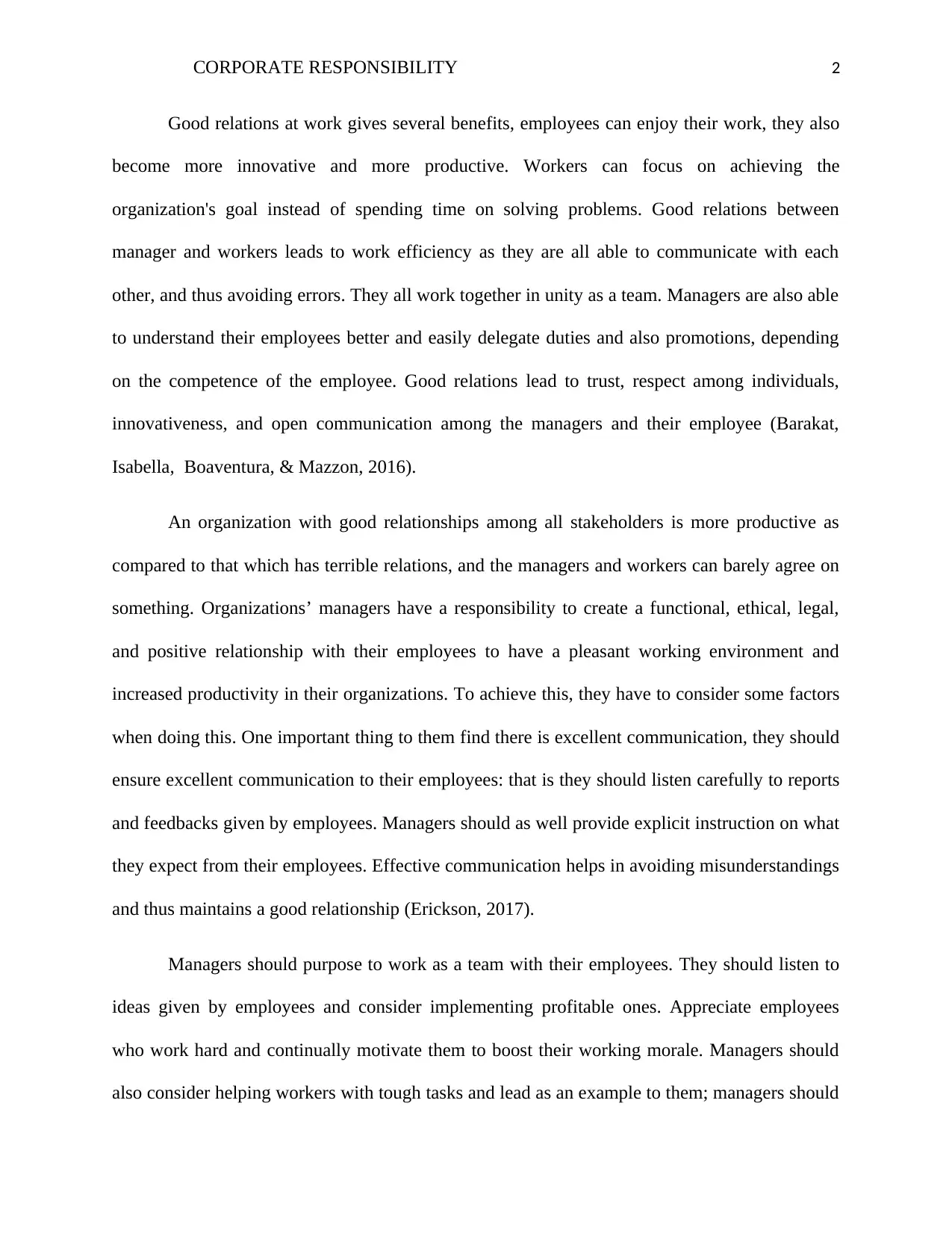
CORPORATE RESPONSIBILITY 2
Good relations at work gives several benefits, employees can enjoy their work, they also
become more innovative and more productive. Workers can focus on achieving the
organization's goal instead of spending time on solving problems. Good relations between
manager and workers leads to work efficiency as they are all able to communicate with each
other, and thus avoiding errors. They all work together in unity as a team. Managers are also able
to understand their employees better and easily delegate duties and also promotions, depending
on the competence of the employee. Good relations lead to trust, respect among individuals,
innovativeness, and open communication among the managers and their employee (Barakat,
Isabella, Boaventura, & Mazzon, 2016).
An organization with good relationships among all stakeholders is more productive as
compared to that which has terrible relations, and the managers and workers can barely agree on
something. Organizations’ managers have a responsibility to create a functional, ethical, legal,
and positive relationship with their employees to have a pleasant working environment and
increased productivity in their organizations. To achieve this, they have to consider some factors
when doing this. One important thing to them find there is excellent communication, they should
ensure excellent communication to their employees: that is they should listen carefully to reports
and feedbacks given by employees. Managers should as well provide explicit instruction on what
they expect from their employees. Effective communication helps in avoiding misunderstandings
and thus maintains a good relationship (Erickson, 2017).
Managers should purpose to work as a team with their employees. They should listen to
ideas given by employees and consider implementing profitable ones. Appreciate employees
who work hard and continually motivate them to boost their working morale. Managers should
also consider helping workers with tough tasks and lead as an example to them; managers should
Good relations at work gives several benefits, employees can enjoy their work, they also
become more innovative and more productive. Workers can focus on achieving the
organization's goal instead of spending time on solving problems. Good relations between
manager and workers leads to work efficiency as they are all able to communicate with each
other, and thus avoiding errors. They all work together in unity as a team. Managers are also able
to understand their employees better and easily delegate duties and also promotions, depending
on the competence of the employee. Good relations lead to trust, respect among individuals,
innovativeness, and open communication among the managers and their employee (Barakat,
Isabella, Boaventura, & Mazzon, 2016).
An organization with good relationships among all stakeholders is more productive as
compared to that which has terrible relations, and the managers and workers can barely agree on
something. Organizations’ managers have a responsibility to create a functional, ethical, legal,
and positive relationship with their employees to have a pleasant working environment and
increased productivity in their organizations. To achieve this, they have to consider some factors
when doing this. One important thing to them find there is excellent communication, they should
ensure excellent communication to their employees: that is they should listen carefully to reports
and feedbacks given by employees. Managers should as well provide explicit instruction on what
they expect from their employees. Effective communication helps in avoiding misunderstandings
and thus maintains a good relationship (Erickson, 2017).
Managers should purpose to work as a team with their employees. They should listen to
ideas given by employees and consider implementing profitable ones. Appreciate employees
who work hard and continually motivate them to boost their working morale. Managers should
also consider helping workers with tough tasks and lead as an example to them; managers should
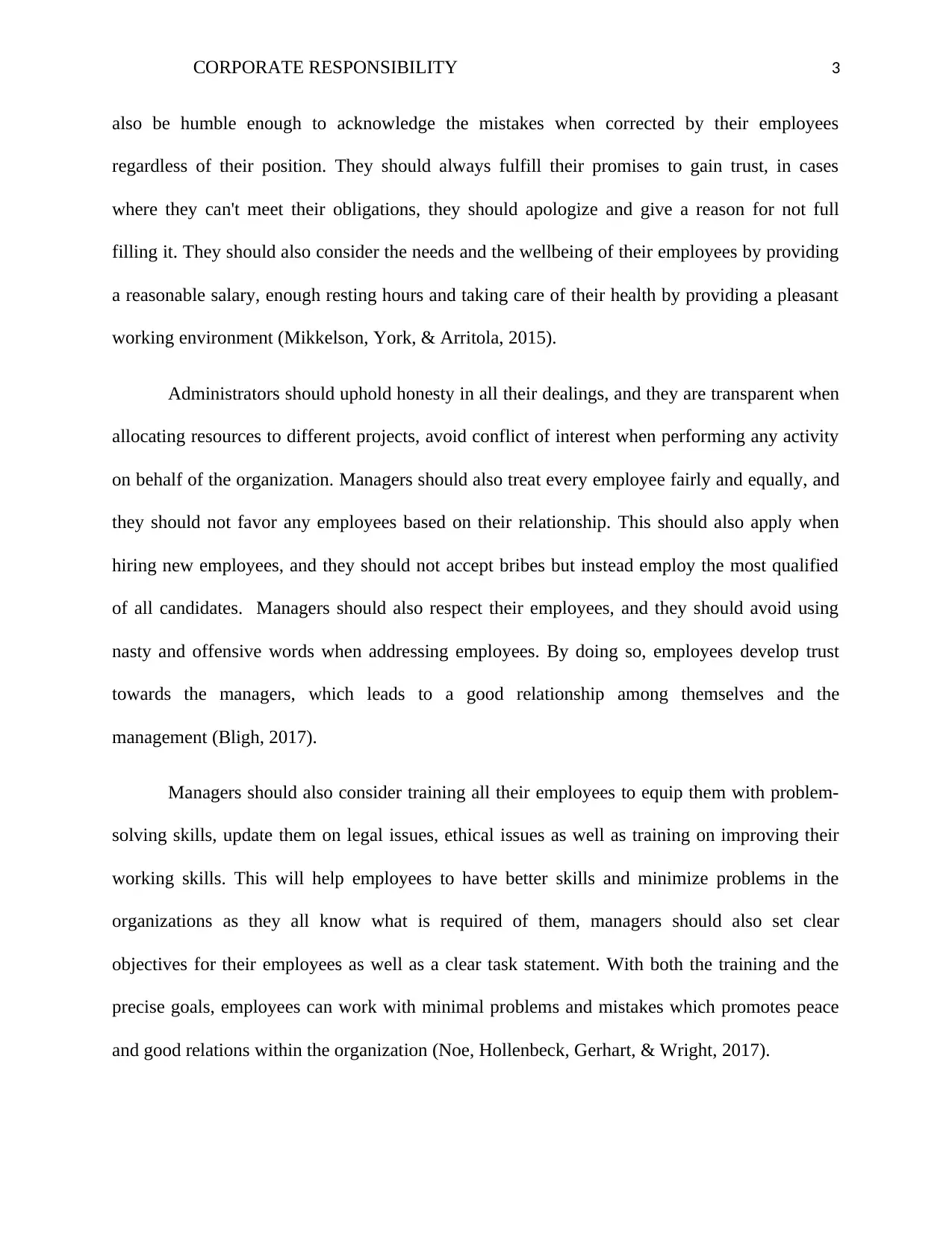
CORPORATE RESPONSIBILITY 3
also be humble enough to acknowledge the mistakes when corrected by their employees
regardless of their position. They should always fulfill their promises to gain trust, in cases
where they can't meet their obligations, they should apologize and give a reason for not full
filling it. They should also consider the needs and the wellbeing of their employees by providing
a reasonable salary, enough resting hours and taking care of their health by providing a pleasant
working environment (Mikkelson, York, & Arritola, 2015).
Administrators should uphold honesty in all their dealings, and they are transparent when
allocating resources to different projects, avoid conflict of interest when performing any activity
on behalf of the organization. Managers should also treat every employee fairly and equally, and
they should not favor any employees based on their relationship. This should also apply when
hiring new employees, and they should not accept bribes but instead employ the most qualified
of all candidates. Managers should also respect their employees, and they should avoid using
nasty and offensive words when addressing employees. By doing so, employees develop trust
towards the managers, which leads to a good relationship among themselves and the
management (Bligh, 2017).
Managers should also consider training all their employees to equip them with problem-
solving skills, update them on legal issues, ethical issues as well as training on improving their
working skills. This will help employees to have better skills and minimize problems in the
organizations as they all know what is required of them, managers should also set clear
objectives for their employees as well as a clear task statement. With both the training and the
precise goals, employees can work with minimal problems and mistakes which promotes peace
and good relations within the organization (Noe, Hollenbeck, Gerhart, & Wright, 2017).
also be humble enough to acknowledge the mistakes when corrected by their employees
regardless of their position. They should always fulfill their promises to gain trust, in cases
where they can't meet their obligations, they should apologize and give a reason for not full
filling it. They should also consider the needs and the wellbeing of their employees by providing
a reasonable salary, enough resting hours and taking care of their health by providing a pleasant
working environment (Mikkelson, York, & Arritola, 2015).
Administrators should uphold honesty in all their dealings, and they are transparent when
allocating resources to different projects, avoid conflict of interest when performing any activity
on behalf of the organization. Managers should also treat every employee fairly and equally, and
they should not favor any employees based on their relationship. This should also apply when
hiring new employees, and they should not accept bribes but instead employ the most qualified
of all candidates. Managers should also respect their employees, and they should avoid using
nasty and offensive words when addressing employees. By doing so, employees develop trust
towards the managers, which leads to a good relationship among themselves and the
management (Bligh, 2017).
Managers should also consider training all their employees to equip them with problem-
solving skills, update them on legal issues, ethical issues as well as training on improving their
working skills. This will help employees to have better skills and minimize problems in the
organizations as they all know what is required of them, managers should also set clear
objectives for their employees as well as a clear task statement. With both the training and the
precise goals, employees can work with minimal problems and mistakes which promotes peace
and good relations within the organization (Noe, Hollenbeck, Gerhart, & Wright, 2017).
⊘ This is a preview!⊘
Do you want full access?
Subscribe today to unlock all pages.

Trusted by 1+ million students worldwide
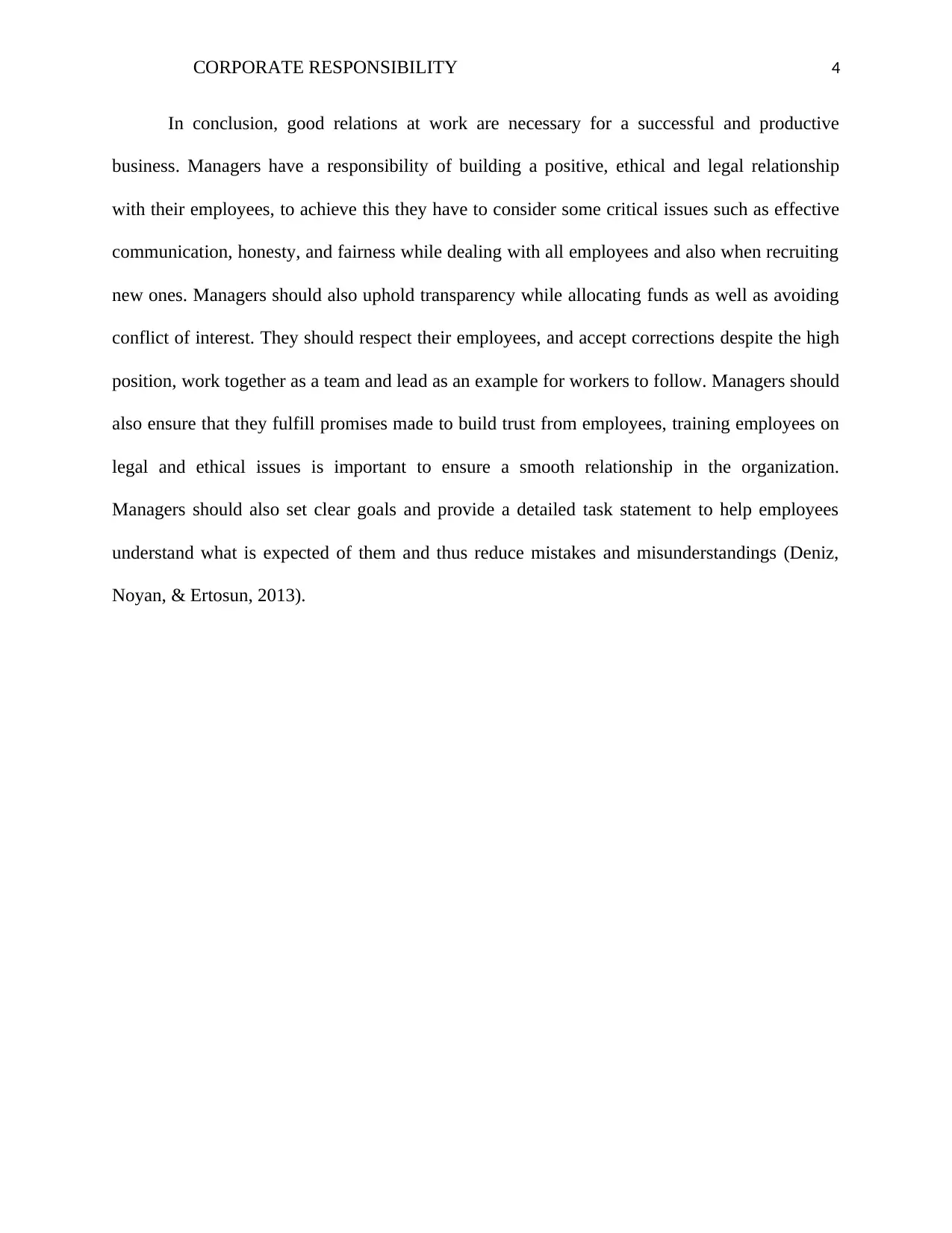
CORPORATE RESPONSIBILITY 4
In conclusion, good relations at work are necessary for a successful and productive
business. Managers have a responsibility of building a positive, ethical and legal relationship
with their employees, to achieve this they have to consider some critical issues such as effective
communication, honesty, and fairness while dealing with all employees and also when recruiting
new ones. Managers should also uphold transparency while allocating funds as well as avoiding
conflict of interest. They should respect their employees, and accept corrections despite the high
position, work together as a team and lead as an example for workers to follow. Managers should
also ensure that they fulfill promises made to build trust from employees, training employees on
legal and ethical issues is important to ensure a smooth relationship in the organization.
Managers should also set clear goals and provide a detailed task statement to help employees
understand what is expected of them and thus reduce mistakes and misunderstandings (Deniz,
Noyan, & Ertosun, 2013).
In conclusion, good relations at work are necessary for a successful and productive
business. Managers have a responsibility of building a positive, ethical and legal relationship
with their employees, to achieve this they have to consider some critical issues such as effective
communication, honesty, and fairness while dealing with all employees and also when recruiting
new ones. Managers should also uphold transparency while allocating funds as well as avoiding
conflict of interest. They should respect their employees, and accept corrections despite the high
position, work together as a team and lead as an example for workers to follow. Managers should
also ensure that they fulfill promises made to build trust from employees, training employees on
legal and ethical issues is important to ensure a smooth relationship in the organization.
Managers should also set clear goals and provide a detailed task statement to help employees
understand what is expected of them and thus reduce mistakes and misunderstandings (Deniz,
Noyan, & Ertosun, 2013).
Paraphrase This Document
Need a fresh take? Get an instant paraphrase of this document with our AI Paraphraser
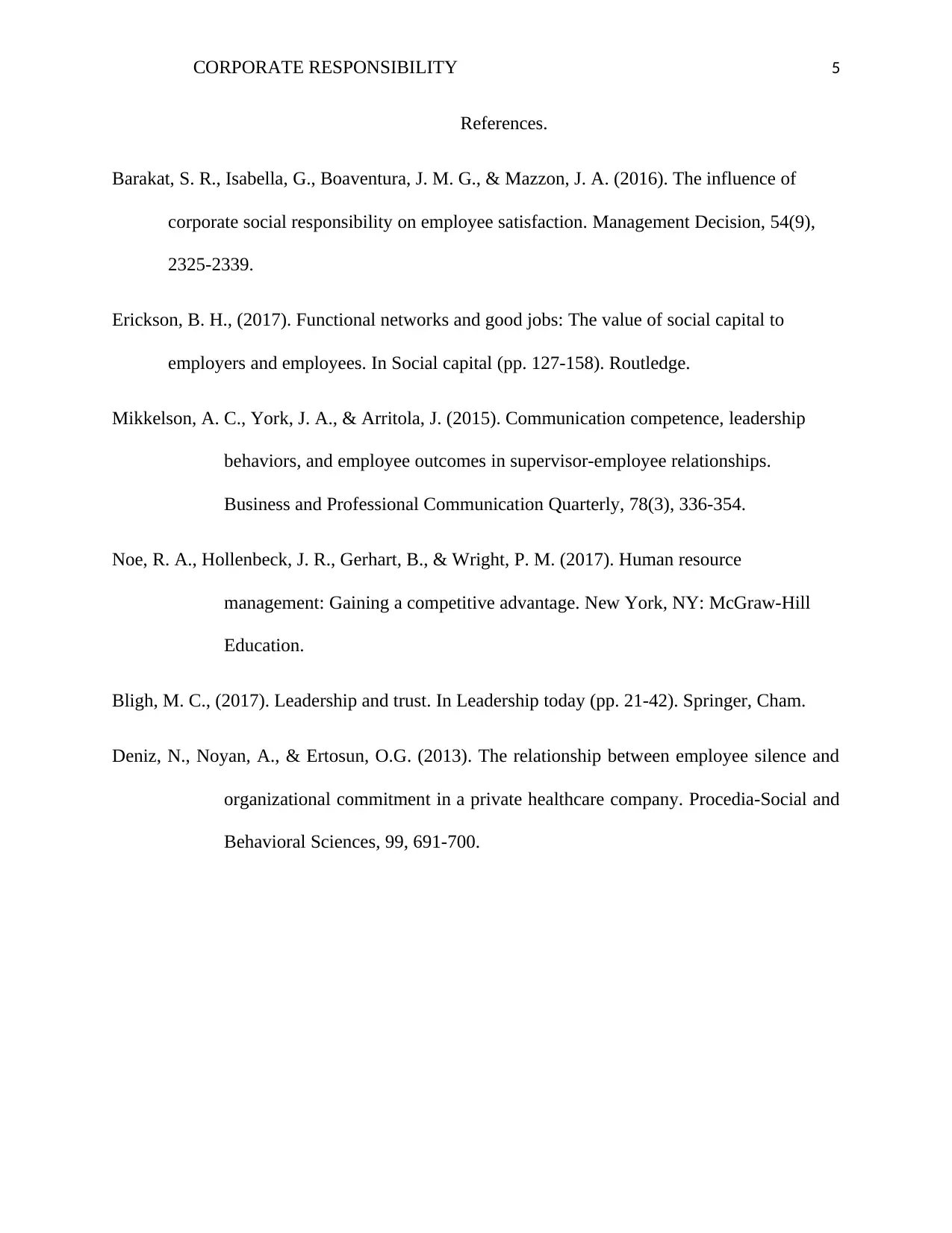
CORPORATE RESPONSIBILITY 5
References.
Barakat, S. R., Isabella, G., Boaventura, J. M. G., & Mazzon, J. A. (2016). The influence of
corporate social responsibility on employee satisfaction. Management Decision, 54(9),
2325-2339.
Erickson, B. H., (2017). Functional networks and good jobs: The value of social capital to
employers and employees. In Social capital (pp. 127-158). Routledge.
Mikkelson, A. C., York, J. A., & Arritola, J. (2015). Communication competence, leadership
behaviors, and employee outcomes in supervisor-employee relationships.
Business and Professional Communication Quarterly, 78(3), 336-354.
Noe, R. A., Hollenbeck, J. R., Gerhart, B., & Wright, P. M. (2017). Human resource
management: Gaining a competitive advantage. New York, NY: McGraw-Hill
Education.
Bligh, M. C., (2017). Leadership and trust. In Leadership today (pp. 21-42). Springer, Cham.
Deniz, N., Noyan, A., & Ertosun, O.G. (2013). The relationship between employee silence and
organizational commitment in a private healthcare company. Procedia-Social and
Behavioral Sciences, 99, 691-700.
References.
Barakat, S. R., Isabella, G., Boaventura, J. M. G., & Mazzon, J. A. (2016). The influence of
corporate social responsibility on employee satisfaction. Management Decision, 54(9),
2325-2339.
Erickson, B. H., (2017). Functional networks and good jobs: The value of social capital to
employers and employees. In Social capital (pp. 127-158). Routledge.
Mikkelson, A. C., York, J. A., & Arritola, J. (2015). Communication competence, leadership
behaviors, and employee outcomes in supervisor-employee relationships.
Business and Professional Communication Quarterly, 78(3), 336-354.
Noe, R. A., Hollenbeck, J. R., Gerhart, B., & Wright, P. M. (2017). Human resource
management: Gaining a competitive advantage. New York, NY: McGraw-Hill
Education.
Bligh, M. C., (2017). Leadership and trust. In Leadership today (pp. 21-42). Springer, Cham.
Deniz, N., Noyan, A., & Ertosun, O.G. (2013). The relationship between employee silence and
organizational commitment in a private healthcare company. Procedia-Social and
Behavioral Sciences, 99, 691-700.
1 out of 5
Related Documents
Your All-in-One AI-Powered Toolkit for Academic Success.
+13062052269
info@desklib.com
Available 24*7 on WhatsApp / Email
![[object Object]](/_next/static/media/star-bottom.7253800d.svg)
Unlock your academic potential
Copyright © 2020–2026 A2Z Services. All Rights Reserved. Developed and managed by ZUCOL.





